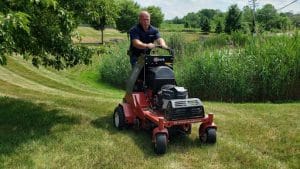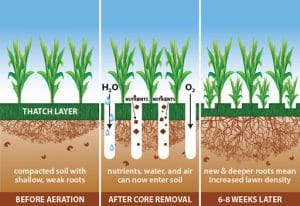 There’s no secret to getting a healthier, more vibrant lawn—though it might seem that way if your commercial property is struggling in spite of fertilization and regular maintenance. Certainly, a comprehensive commercial lawn care service is crucial to keep grass looking good and growing strong. But, there’s more to it than that. What some property managers overlook is the part of their lawns that they don’t see. And, over time, soil and the underlying thatch in your lawn becomes compacted, which can prevent essential nutrients, oxygen and water from reaching the root system.
There’s no secret to getting a healthier, more vibrant lawn—though it might seem that way if your commercial property is struggling in spite of fertilization and regular maintenance. Certainly, a comprehensive commercial lawn care service is crucial to keep grass looking good and growing strong. But, there’s more to it than that. What some property managers overlook is the part of their lawns that they don’t see. And, over time, soil and the underlying thatch in your lawn becomes compacted, which can prevent essential nutrients, oxygen and water from reaching the root system.
The Culprit: Soil Compaction
Soil compaction basically causes your grass to choke, so no matter what other maintenance regimens you’re using to care for the turf, if you don’t address what lies beneath, you are wasting time, resources and your budget.
A compacted lawn is common in commercial properties because foot traffic can be a trigger. The gathering spaces and common areas of your commercial grounds are especially susceptible to compaction. Compaction also results from a buildup of thatch and debris above the soil line.
Is your soil suffering from compaction? Here are some common signs: run-off water, pooling or puddling of water, bare spots in your grass and slow turf growth. Also, you might notice yellowing grass or weeds that can survive without a lot of oxygen. If you can peel back a bit of the turf very easily, your roots are likely shallow—also a sign of compacted soil.
The Cost of Lawn Aeration
 Sometimes property managers neglect to aerate because they are concerned about the expense of this service on a large property. They might figure, “I’ll do it myself,” or assign the task to someone on staff. But the problem is, aerating a large property is very time and labor-intensive, and it’s not as simple as it looks. Care must be taken to avoid buried lines, irrigation system heads, tree roots and other obstacles. Also, improving the flow of oxygen requires special machinery.
Sometimes property managers neglect to aerate because they are concerned about the expense of this service on a large property. They might figure, “I’ll do it myself,” or assign the task to someone on staff. But the problem is, aerating a large property is very time and labor-intensive, and it’s not as simple as it looks. Care must be taken to avoid buried lines, irrigation system heads, tree roots and other obstacles. Also, improving the flow of oxygen requires special machinery.
For all these reasons and more, property managers are wise to enlist in a professional that provides commercial lawn aeration.
Rather than focusing on the cost of the service, consider the cost of not alleviating soil compaction in your commercial lawn. How much could you be spending on groundskeeping products that are not actually reaching the turf roots? How much would it cost you to reseed your lawn if compaction resulted in so many bare or weedy spots that the lawn could not recover on its own? How much will your reputation suffer if your yard looks unappealing?
What to Expect from Core Aeration
 You should introduce air into the lawn on an annual basis, and we generally recommend this in the late summer or early fall, after the heat subsides. This way, the soil is not overly stressed and can handle the disruption of a core aerating machine. Usually, core aeration is paired with overseeding to fill in your soil with fresh, healthy grass. This is another reason we recommend lawn aeration in fall, an ideal time to grow grass. So, how does core aeration work? The process involves pulling up plugs of turf and soil, which is accomplished by an aerator with tines that roll over your land.
You should introduce air into the lawn on an annual basis, and we generally recommend this in the late summer or early fall, after the heat subsides. This way, the soil is not overly stressed and can handle the disruption of a core aerating machine. Usually, core aeration is paired with overseeding to fill in your soil with fresh, healthy grass. This is another reason we recommend lawn aeration in fall, an ideal time to grow grass. So, how does core aeration work? The process involves pulling up plugs of turf and soil, which is accomplished by an aerator with tines that roll over your land.
The soil plugs sit on the surface for up to a few weeks, but they can break down much quicker. The roughly 3-inch soil plugs naturally decompose and settle back into the soil—and mowing generally breaks up the soil plugs, too. So, your lawn will not be in transition for too long.
Aeration does not change your regular mowing or lawn care program. In fact, it will maximize the results of your lawn maintenance efforts because the soil and turf roots will literally be more “open” to receiving nutrients, oxygen and water. You can expect your grass to look healthier and be more resilient as a result of alleviating soil compaction.
For a Healthy Turf—Call the Pros
Core aeration is strenuous yet necessary, and the landscape service professionals at Neave Landscape Management understand the right timing and technique for this important cultural practice. Don’t put off alleviating soil compaction to keep your lawn green for another year. As summer winds down, now is the time to schedule the service so you can maintain a healthy lawn.
Call us for a free site assessment and we’ll identify if compaction is an issue on your commercial property. Contact us in Westchester, NY at 914-271-7996, Hudson Valley at 845-463-0592, Connecticut at 203-212-4800 and New Jersey at 201-591-4570. Or, fill out our contact form and we’ll get in touch with you.